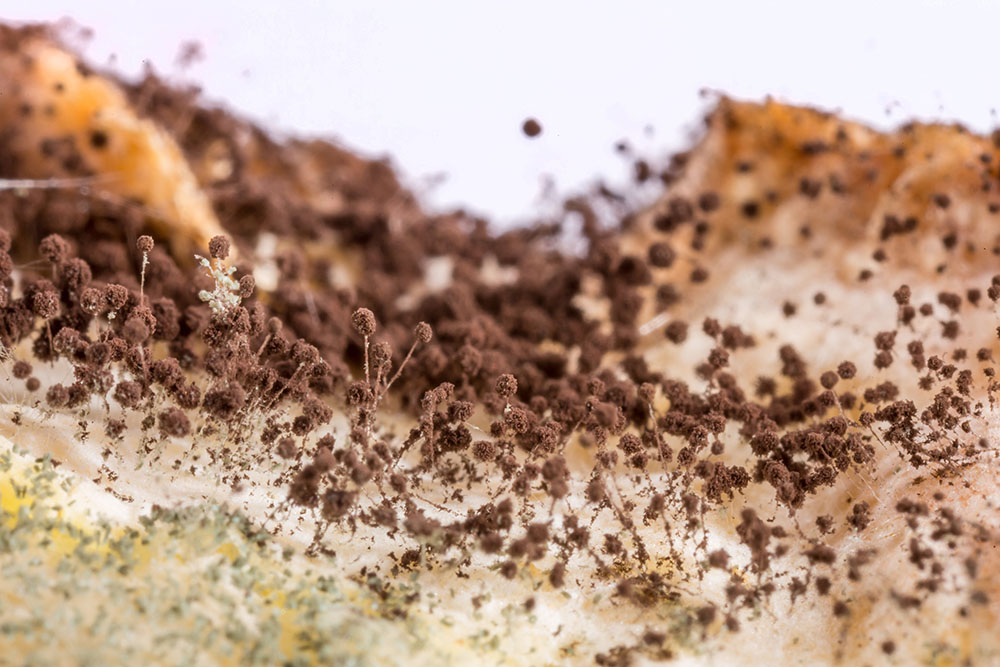When Does Mould Release Spores?

CONTENTS
- Understanding mould Spores and their release mechanisms
- The role of environmental conditions in mould spore release
- Water leaks and their connection to mould spore proliferation
- Ventilation's impact on mould spore spread
- Disturbing mould: risks and precautions
- Practical measures for a healthier living environment
- The role of professional mould remediation
- Frequently asked questions
- Get in touch
Beneath the visible signs of mould, millions of invisible spores are ready to disperse and continue their life cycle. When conditions are right, these microscopic spores burst from their colonies. Once airborne, they spread across our living spaces and further mould growth in your home.
At ICE Cleaning, we offer comprehensive mould removal services, where our technicians can identify the root cause of mould and assist you in preventing its return. Our technicians adhere to Awaab's Law and work closely with your local council to deliver excellent results.
Read on to learn more about what triggers mould to release into your environment and what you can do to prevent it.
Understanding mould spores and their release mechanisms
Mould spores, the starting point for mould growth, are always present in our environment. They float freely until they land on a suitable substrate and growing into mature fungi. The atmosphere and humidity can significantly affect the development of mould spores.
The release of these spores often occurs when conditions become less favourable for their growth or during disturbance events like human activity or wind. The tiny size of these spores lets them disperse to new areas where they may find more favourable conditions.
To ensure we live in healthier homes, understanding this release mechanism is crucial as it allows us to control mould spread better by managing its triggers effectively.
The role of environmental conditions in mould spore release
Mould spores are highly sensitive to environmental changes. When conditions are just right, they start their growth cycle. Research shows that temperature plays a key role: cooler temperatures slow the release of mould spores, but when it gets warmer, the process speeds up.
Humidity impacts environments with high moisture levels: mould thrives and releases more spores into the air. Light is also a contributing factor - while mould can grow in dark places, exposure to light triggers increased spore production.
To prevent this cycle from starting or continuing, understanding these factors and controlling them is crucial for maintaining a healthy living environment free from excess mould spores.
Water leaks and their connection to mould spore proliferation
Mould spores will be released when water leaks occur, contributing to a damp environment. Water seeping from pipes or roofs provides the ideal conditions that mould requires to thrive.
Not only is the spread of mould a visual issue, but it also poses a health risk. Breathing in these spores can lead to respiratory issues and allergies. To prevent mould, tackle any leaks promptly and thoroughly dry out affected areas.
For stubborn cases of infestation where the mould keeps returning or is in an unreachable area, you should consider seeking help from professional cleaning services.
Ventilation's impact on mould spore spread
Proper ventilation plays a crucial role in controlling mould spores. A well-ventilated space can significantly reduce the chance of mould growth by maintaining air movement and reducing humidity levels, conditions that deter the release of mould spores.
Maintaining good airflow goes beyond opening windows or doors, it also involves using exhaust fans in high-humidity areas like bathrooms and kitchens to remove excess moisture.
It is crucial to have good air quality indoors to prevent mould and perform maintenance to ensure proper ventilation is supported. These simple tasks can remove the airborne spores or lower the likelihood of initial growth.
Disturbing mould: risks and precautions
Cleaning mould yourself is risky, as even a small disturbance can cause a surge in spore release, putting your health at risk when you inhale or touch it.
Mould colonies consistently release invisible spores into your living space when you ignore them or interact with them. When you scrub or scrape them away without taking precautions, this triggers an explosion of these airborne spores into the air around you.
You must hire mould experts who have industrial-grade gloves, masks and goggles for mould cleaning. Their experience and specialised equipment can effectively tackle such tasks safely and prevent mould from returning.
Practical measures for a healthier living environment
Maintaining your living space in an optimal state to prevent mould growth is crucial. The first step involves controlling environmental conditions: high humidity and temperature can stimulate spore release, so using air conditioners or dehumidifiers can help.
Avoiding water leaks also contributes significantly to maintaining a healthy environment. Fix any leaking pipes promptly and make sure you are drying wet areas quickly, as this could prevent mould from growing.
Beyond these measures, adequate ventilation plays an essential role. Regularly opening windows or using exhaust fans helps circulate fresh air and reduce moisture levels indoors.
If faced with visible mould colonies, do not disturb them without professional assistance. Touching the colony might cause it to release more spores into your surroundings.
The role of professional mould remediation
Professional mould remediation plays a crucial role in maintaining healthy living conditions. When left unchecked, mould can proliferate rapidly, leading to an unhealthy surge in spore release.
This is where the expertise of companies like ICE Cleaning comes into play. We use advanced methods and tools to remove mould effectively without causing more harm.
We must treat mould with the same urgency as a burst pipe. We need professional help not only to fix current problems but also to prevent future ones from occurring by identifying potential sources of moisture or inadequate ventilation.
Frequently asked questions
Are mould spores harmful?
Mould spores can trigger allergic reactions, cause respiratory issues, or even lead to more serious health problems if you're exposed over a long time.
What are the symptoms caused by mould spores?
Symptoms from inhaling mould spores vary but often include sneezing, runny nose, red eyes and skin rash. Asthmatics may have worse symptoms due to an allergic reaction.
Can you get rid of mould spores?
You can significantly reduce mould spore count in your home by controlling moisture levels and using air purifiers. However, eliminating all indoor airborne mould is almost impossible.
What kills mould spores?
Mould spores are consistently present in our everyday lives, so it is impossible to kill mould spores. You can limit their presence indoors with good ventilation, air purifiers, and open windows.
Get in touch
At ICE Cleaning, our mould cleaning services include the expertise of a team, who are skilled at discovering the underlying causes of mould growth and help protect you against future growth. Our remedies utilise the latest technology and cleaning solutions to eradicate mould.
To find out more about our mould remediation services, talk to a member of our team today at 0208 066 0360 or enquiries@icecleaning.co.uk at any time, 365 days a year. With all our mould services, we have an emergency team that can be on-site within a few hours of your first call.

Speak with me today,
I’m here to help
By asking you a few questions either via phone or email I can immediately provide a realistic estimation of the cost.
You’re in good company. We’ve cleaned for the following commercial clients… View all

Why choose us?
- Cater to a wide variety of cleaning situations
- Nationwide coverage, available 24/7
- Cater to commercial and domestic clients
- Free survey provided prior to quotation
- Emergency response team
- Offer a bespoke service designed to suit all your needs
- All technicians hold professional health and safety qualifications, including BICSc, IOSH, Dewpoint Professional & Safe Contractor
We’re fully accredited
We place best practise, professional expertise and health and safety at the core of our business. We’re fully compliant with all legal obligations. You can view a list of our accreditations below, or visit our Health & Safety page for more information.











-RGB-small.1707319151.jpg)




















